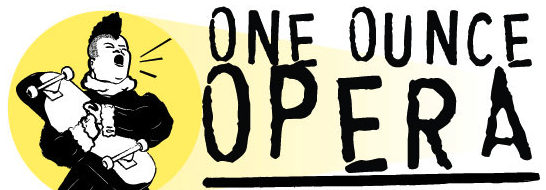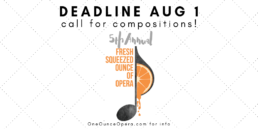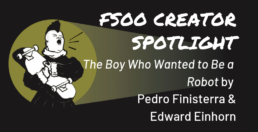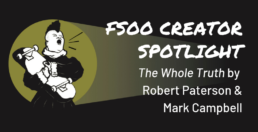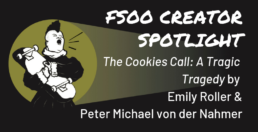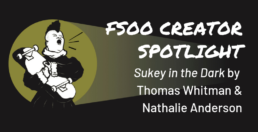5th Annual Call for Short Operas!
NOTE: The 2019-2020 competition is now closed.
___
ONE OUNCE OPERA’S 5th ANNUAL CALL FOR SHORT OPERA SUBMISSIONS!
Composers and librettists: We’d like to formally invite you to submit work to our 5th Annual Fresh Squeezed Ounce of Opera Competition. Winning pieces will be produced and performed by One Ounce Opera in Austin, Texas, as part of the first – and only – short opera showcase in the state.
THE 2019-20 COMPETITION IS NOW CLOSED.
This will be the 5th annual Fresh Squeezed Ounce of Opera (FSOO) – the premier short opera showcase of Texas. The popular, award-nominated event celebrates new works and contemporary voices. Creators who identify with a historically underrepresented group (women, people of color, LGBTQ+ folks, etc.) are highly encouraged to apply.
In addition to having works produced, fully staged, and performed in Austin by a cast of professional singers, One Ounce Opera spotlights each composer/librettist in an informal interview that includes questions from the cast. Each work is highlighted in our newsletter and on social media, and each winner receives a professionally-edited live video and audio recording. At each performance, attending composers/librettists will be acknowledged and awarded a certificate (and some swag).
See composer spotlights and videos from 2018’s 3rd annual FSOO.
Creator spotlights for 4th Annual FSOO are here. Videos from the 4th Annual FSOO are here.
************
FAQ:
Where can I see the official rules for the FSOO competition? Guidelines appear on the entry form. The application link is live between June 1st- August 1st, 2019. Please review the rules in detail before submitting any work. Works that do not fit within the guidelines will not be considered.*
When are the performances? FSOO will be two weekends in late February/early March 2020. Exact dates will be posted soon.
Where do you stage the shows? One Ounce Opera transforms a raw, flexible artists’ warehouse in East Austin into an unexpected space for opera performance. The vibe is laid back, accessible, and inclusive.
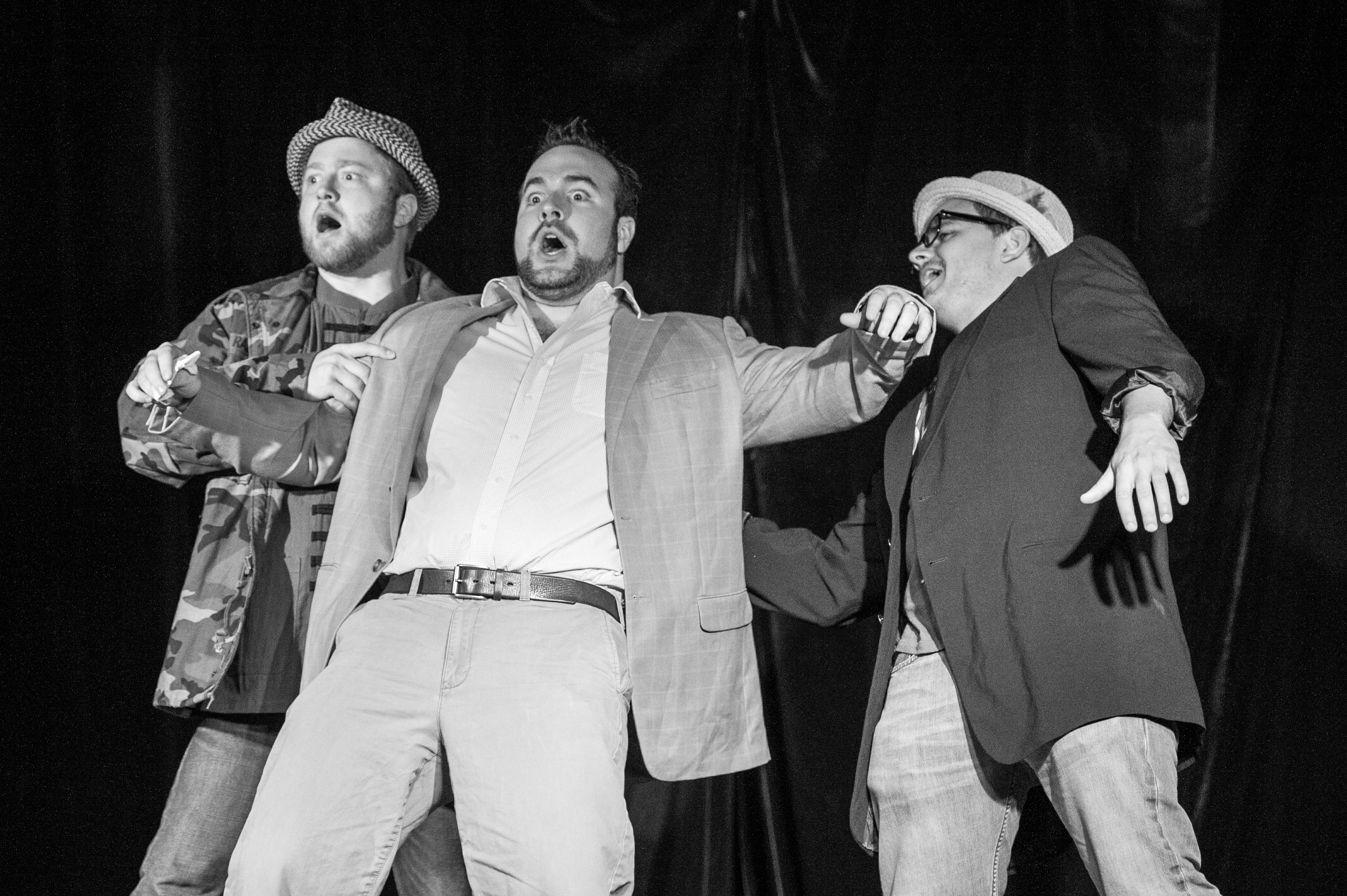 How do I submit my files? On the entry form, you will supply a link to an online folder. We must be able to download the score, libretto, and an mp3 of the work. For accuracy, please convert all text/score files to PDF and all MIDI files to mp3 before sending. Example of what/where to upload and link to: Dropbox folder, Google Drive, YouTube, SoundCloud, other storage methods that can be accessed via link. The required materials are listed on the form. Please note: direct email of materials will not be accepted.
How do I submit my files? On the entry form, you will supply a link to an online folder. We must be able to download the score, libretto, and an mp3 of the work. For accuracy, please convert all text/score files to PDF and all MIDI files to mp3 before sending. Example of what/where to upload and link to: Dropbox folder, Google Drive, YouTube, SoundCloud, other storage methods that can be accessed via link. The required materials are listed on the form. Please note: direct email of materials will not be accepted.
Will you perform my work with orchestra? FSOO performances are with piano only. We will perform from your piano/vocal score, so make sure it’s performance-ready before submitting.
Am I allowed to submit more than one work? YES! As long as each submitted work follows the guidelines of the competition, we welcome multiple entries. Guidelines can be found on the form.
I submitted more than one opera. Could they BOTH be chosen? YES! However, it is highly likely only one would be chosen.
You guys have chosen my work before. Could I enter again this year? YES. Past winners are welcome to submit new work.
How will I know if my work was chosen? Winning works will be announced via Facebook and a post on this site, and the winners will be notified shortly thereafter. Copies of all parts and any revisions will be due at that time.
How do I keep up with any new developments in the competition? For the latest details, we strongly suggest following One Ounce Opera on Facebook, and adding yourself to the Facebook event page. We will add you to our FSOO newsletter, as well.
Once again, when exactly is the deadline? The hard-and-fast deadline for entry into FSOO was 11:59pm on August 1st, 2019. Only complete applications — with all required materials received as requested by the deadline — will be considered.
I have a question not answered here. How do I get in touch? Click here to send us a message about the competition!
*Note: the competition in 2019-20 is for short operas only. Art songs and song cycles are not being reviewed this fiscal year.
FSOO Creator Spotlight - Pedro Finisterra and Edward Einhorn
As part of the 4th Annual Fresh Squeezed Ounce of Opera, One Ounce Opera is happy to announce the American Premiere of The Boy Who Wanted to Be a Robot, from composer Pedro Finisterra and librettist Edward Einhorn (both of which will be in the house opening night!). The cast -- Julie Silva (Orgo), Robert LeBas (Kingo), Angela Irving (Calco), Brian Minnick (Cleano) and Carmen Johnson (Sally) -- wiggled out of their robot gear to pen these questions for the creators:
Can you tell us how this whole story started, the forms that it took along the way (in searching, we noticed a puppet show!), and how all that happened?
Edward: I originally wrote the puppet play version of this story for a festival called NEUROfest, held in New York in 2006. The idea was that Orgo was a boy on the spectrum, or as it was more commonly called at the time, he had Asperger's. It was performed as part of the NEOROfest and then performed again as part of an evening called Brains and Puppets, which included another puppet play about synesthesia. When Pedro and I were pitching ideas for our Opera Writing Masters degree at the Guildhall School of Music and Drama, we picked this as one of our ideas. There were a few reasons--I knew Pedro was interested in stories for children and stories with a sci fi element. Pedro also was diagnosed with Asperger's when young, so I felt he would be the perfect composer for it. The staff chose this idea for our project, and we went from there. The origin of the story is sort of hidden beneath it, but the story is just a story...it can live on its own, with or without the subtext about being on the spectrum.
Pedro: “The Boy Who Wanted to be a Robot” is the final project of a Master’s degree in Opera Making & Writing that Edward (as a librettist) and I (as a composer) did at Guildhall School of Music and Drama in London, United Kingdom, during the academic year of 2017/2018. After some time brainstorming ideas, we came up with four (some of them later on were used by Edward in some of his other projects) that we pitched to the heads of Guildhall’s opera department and they picked this one.Even though this piece is an adaptation of Edward’s puppet play, it almost feels to me as a reboot of a media franchise, as this version adds new characters and recycles some important plot events in different ways while still maintaining its essence (yes, Edward and I talked a lot about comic books, movies and video game franchises while brainstorming ideas for this project, as reboots are very common in these mediums). To add up to this, this is a piano version of the opera we presented in London, as the original one made use of an ensemble of 10 performers.
In both the opera and the play that seems to have inspired it, physical contact is not allowed between humans and robots (although Kingo seems to be exempt from that rule), and the robots seem to hold humans in lower regard. Is this simply a byproduct of their logical nature and emotional incompetence as robots, or is there something that happened in their world before this that led to this sort of hierarchical setup?
Edward: For me, the physical contact aspect of the story was partially inspired by the fact that children on the spectrum often have difficulty with physical contact. Temple Grandin famously created a hug machine for herself, so she fulfill her desire to be hugged without the discomfort. In the robot world, hugs are connected to an emotional element they simply find unnecessary. Much like the Wild Child who grew up in the forest, Orgo grows up unused to physical contact, which makes it uncomfortable for him. I was also playing off the trope of the robots or puppets who long to be human, because being human is superior (sometimes we call the show a Pinnochio story in reverse). So in my story, it is the robots who feel themselves to be obviously superior. And of course Orgo, as a child, wants to be like everyone around him, so he sees them as superior as well.
Pedro: Well... even though robots are in control of the world during the events of this opera, they are not necessarily “antagonists” to humanity. On the contrary: they have been trying to save humanity through eugenics because humanity almost got extinct. What is not clear is why they are doing it, as they do not rule themselves by human moral codes, nor feel emotions. Because humans feel emotions and robots are not programmed to comprehend them, only to behave and process information logically, they see these emotions as barriers for logic reasoning. A good example to illustrate this “amoral code” would be why Kingo (SPOILER ALERT) changes his mind regarding Orgo, as to him it’s more important not to create a “broken organic unit” than to save humanity. Although, him changing his mind about something reveals about him an almost human side... Who knows if Kingo is not a cyborg himself?! Or a robot upgraded with organic features. That could explain his motivations...Regarding physical contact, it’s not that touch isn’t permitted between humans and robots, but because human physical contact is heavily driven by emotional reasons (comfort, protection, empathy, sensuality, love, etc.), there is no point for robots to share physical contact for those reasons. I imagine that physical contact in robot society could be motivated more probably for the exchange of information/data, just like ants touch their antennas to transmit hormones that contain useful information for the rest of the colony’ survival.
Sally references there only being 500 humans left. Are those spread out across somewhere or are they all in the same location? Is she the only "real human" living in our story's current location?
Edward: I always envisioned that there was a large outpost of humans in a few days walking distance away, and maybe a few others scattered around the planet. But of course that is fully up to interpretation.Pedro: If humans are not living all in the same location, I assume they at least have to live in a few communities that are aware of each others’ existences. That would be the reason why Sally is able to give a number to Orgo. There might be other surviving humans living in isolated communities, in which case this number would be higher, but there would be no way to know how much higher. I don’t know if she is the only human living in this story’s location, but I am sure that, if the robots chose her for this task, that must mean that, according to their algorithms, she alone is indeed the best shot for getting around this boy’s stubbornness!
Sally seems to be seeking connection as much as, or even more than, Orgo. What did you intend to be the primary drivers of that search?
Edward: Sally is looking for a connection, but even more essentially, she's hoping for the survival of the human race. She wants Orgo to connect to her, because by doing so, he becomes incorporated into the human race. She is trying to demonstrate what it is to be human, and a large part of that is emotional connection.
Pedro: I see Sally as a person divided between her duty towards humanity, but at the same side thrilled to finally meet a new human, even if a genetically engineered one. Just like Kingo has an agenda, so does she. However, she gets attached to this fascinating and eccentric child, which is probably why (SPOILER ALERT AGAIN), in the end, she lets Orgo get transformed, at the cost of her completely loosing hope on humanity’s salvation. She is the character that suffers and looses the most in this opera, as she has witnessed the fall of humanity (or at the very least has been living its consequences), and then, when she was finally given hope (through Orgo, even if he had this childish dream of becoming a robot himself), she ultimately fails on changing his mind and preventing the robots transforming him. She not only seeks connection, but in a way, salvation. That is what Orgo means to her.
Even though the end of the opera is (in humanity’s perspective) sad and/or nihilistic, because we are following Orgo’s perspective (which is, as any normal child his age, self centered), it is functionally a happy ending. Orgo doesn’t get exactly what he wanted, but gets close to it (as he is turned into a cyborg instead of a “full robot”), and by accepting it he is finally able to feel happiness and a genuine connection to both Sally and the robots. In the original puppet play, because he is actually turned into a robot, I don’t think that in the end he is happy. I would say that he just... is.
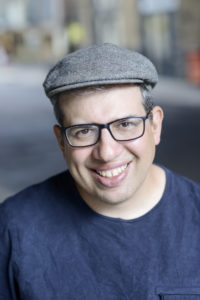
Edward Einhorn is a playwright, director, translator, librettist, and novelist. His work has been performed in New York venues such as La MaMa, 3LD Art & Technology Center, HERE Arts Center, The New Ohio, St. Ann's Warehouse, the Walter Bruno Theater at Lincoln Center, and the Bohemian National Hall. Outside of New York, his work has been done at Peckham Asylum Chapel (London), Wigmore Hall (London), Milton Court at the Barbican (London), Forth Worth Opera (Fort Worth, Texas), Sacred Fools (Los Angeles), and the Czech Embassy (Washington, DC). He is the Artistic Director of Untitled Theater Company No. 61: A Theater of Ideas – a New York independent theater company.
Recent shows include The Marriage of Alice B. Toklas by Gertrude Stein, a comic farce about the lives of Stein and Toklas, which received a Critic’s Pick from the co-chief reviewer of The New York Times, Jesse Green; The Neurology of the Soul, which examined the nexus between neuroscience, marketing, art, and love; The Iron Heel, an adaptation of Jack London’s socialist dystopic novel from 1908; City of Glass, an adaptation of the neo-noir novel by Paul Auster; Money Lab, an economic vaudeville combining multiple performance disciplines (dance, opera, puppetry, cabaret, clowning, and interactive games); The Velvet Oratorio, an opera/theater piece commissioned for the 25th anniversary of the Velvet Revolution; The Pig, or Václav Havel's Hunt for a Pig, an adaptation of Havel's final theatrical work; Rudolf II, a play about the 16th Century Holy Roman Emperor in Prague; The God Projekt, a puppet play about the origin of monotheism; and a stage adaptation of Do Androids Dream of Electric Sheep?
The New York Times has called his work "exquisitely ingenious", “dramatically shrewd,” and "almost unbearably funny"; Time Out has called it "challenging, thought-provoking," “mesmerizing,” and “startlingly intense”; and The Village Voice has called it “hilarious, provocative,” and "Inspired absurdist comedy". He has received a Sloan Grant, SEED Magazine’s Revolutionary Mind Award, The NY Innovative Theater Award for Best Performance Art Production of the Year, NYTheater.com’s Person of the Year Award and placement in their Indie Theater Hall of Fame, 2nd Prize from the Arch and Bruce Brown Foundations Playwriting Competition, a fellowship from American Opera Projects, and Critic’s Picks in Time Out, The Village Voice, and The New York Times.
He has a BA in Writing from Johns Hopkins and an MA in Opera Writing – Librettos from The Guildhall School of Music and Drama. www.edwardeinhorn.com
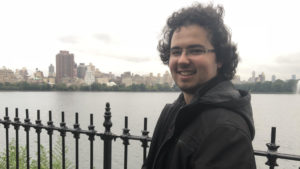
Born in 1994, Lisbon, Portugal, Pedro Finisterra studied Guitar, Piano, Singing, Double Bass and Composition (with Jorge Pereira) at Conservatório de Música de Santarém, having concluded his secondary studies on Musical Theory in 2013. He did his Undergraduate in Composition at Escola Superior de Música de Lisboa (2013-16), studying under Carlos Marecos, Carlos Caires and Luís Tinoco. He also had classes with António Pinho Vargas, Sérgio Azevedo, João Madureira and José Luís Ferreira. In 2018 he finished his MA on Opera Making & Writing - Composition Path, at Guildhall School of Music and Drama, in London, United Kingdom, having studied under Julian Philips. He also had compositions workshops and masterclass with Luigi Abbate, Achim Bornhöft, Guilhermo Klein, Ivan Moody, Apostolos Paraskevas, Ansgar Beste, Julian Anderson, Stephen McNeff, Tapio Tuomela, Ofer Ben-Amots and Jan Jirásek.
He studied Jazz at Hot Club de Portugal (Electric Bass and Combo, with Massimo Cavalli and Gonçalo Marques, respectively) and was a member of Big Band Júnior (2010-14), conducted by Claus Nymark. His composition “Hora de Ponta”, written for this ensemble, is part of their album “Pegadas Azuis”. Since 2017 he has been working with the Portuguese A Capella ensemble “The Spell”, writing arrangements of popular songs for them.
His works have been performed in Portugal, United Kingdom, Germany, Russia and Australia. Some of his most relevant pieces are: “Prjkt.Hrp” (2015, for Harp and Live Electronics), “¡¿Lamento?!”, (2016, for small ensemble, based on Henry Purcell’s opera “Dido and Aeneas”), “Contos da Criação: Lilith” (2016, an oratorio for Narrador, Soprano, Baritone and Small Wind Orchestra, with libretto by Nuno Cruz, based on the relationship between Adam and Lilith according to the Talmud and the Alfabet of Ben Sirach), “@ctb.exp#1” (2017, for solo double bass, comissioned by the Portuguese state radio and television Antena 2/RTP for the 31st edition of the “Prémio Jovens Músicos” music festival), “Multidão - I. Primeiro” (2017, first act of a monodrama for countertenor and ensemble about a person that suffers from multiple personality disorder, with libretto by Nuno Cruz), “Nymphus – Mithraic Initiation Rite Number Two” (2017, short opera scene for Mezzo Soprano, Tenor, Baritone and Piano, based on the second iniciation ritual of the cult of the god Mithras, with libretto by Edward Einhorn) and “La vojaĝo” (2019, for mixed ensemble, written for the Ensemble Offspring during the Noosa ISAM in Australia). He is also one of the producers of the festival “Peças Frescas – Edição Açores” (Fresh Pieces – Azores Edition), a festival of Portuguese contemporary music that happens since 2014 in Ponta Delgada, S. Miguel, Azores. www.pedroffinisterra.com
Admission and info for FSOO here.
FSOO Creator Spotlight - Robert Paterson and Mark Campbell
One Ounce Opera is thrilled to present the Regional Premiere of award-winning composer Robert Paterson and award-winning librettist Mark Campbell's The Whole Truth: A Chamber Opera in Seven Scenes, based on a story by Stephen McCauley, as part of the 4th Annual Fresh Squeezed Ounce of Opera. It is an honor to produce their work! Singers Elise Leung Kotara (Megan A), Allyssa Kemp (Megan B), and Jake Jacobsen (The Man) had these questions for the creators, answered here by Composer Robert Paterson (with a nod of approval from Mark). :)
What are the challenges of composing one role for two voices, and writing comedy?
For me, when composing music with more than multiple vocal parts—operas, for example—the challenge, and I would even say the goal, is to make sure to utilize voice types that compliment each other. In The Whole Truth, Mark’s libretto calls for two female singers, Megan A and Megan B, who represent the “bifurcated soul” of a young married woman. Megan A represents her her outer self (at least the way I viewed her), and Megan B, her inner voice, so to speak. I cast Megan A as a soprano, and Megan B as a mezzo-soprano, primarily because Megan A’s personality seemed brighter, so I associated her brighter personality with a
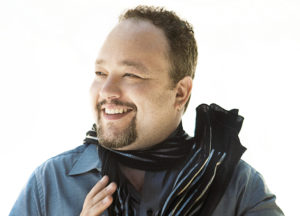
brighter voice-type. Megan B is a bit more sarcastic, with a somewhat darker, biting sense of humor, so to me, for variety, and because it seemed to work well in a timbral sense, I thought it would be effective to have her role performed by a mezzo-soprano. I could have cast them both as the same voice type, but even for a short opera, it’s nice to have a little more sonic variety via different voices, if only to give the ear a break once in a while by alternating from one voice type to another. Also, since there are moments when they sing together as one, two different voice types make it a little easier to distinguish the voices when they are singing intervals, and that was an important factor to consider.
Regarding composing a comic opera, or at least, one that contains elements of humor, the main challenge is to get out of the librettist’s way, or at least to work with and not against the librettist! Having a sense of comedic timing is critical. It’s incredibly easy to ruin a joke if you’re not careful, but far more difficult to make sure it lands correctly. Often times, critics will comment that sections of comic operas sound too conversational, or have too many recitative sections that don’t flow or whatever, but it’s usually extremely difficult to make humorous moments work if you compose through them and not with them. Mark’s libretti are always so economically-written and so incredibly clear, in the best possible way, so it’s obvious when there are humorous moments. He is masterful at getting out of the way of the composer, which is great, but then the pressure is on even more to “bring it” and make sure his words are humorous when they need to be, with the music! Mark always gives plenty of room for that, which is fantastic.
What elements of Stephen McCauley's story inspired you to turn it into an opera?
Mark introduced Stephen's story to me, and I fell in love with it right away. Initially I was a little hesitant, since I had already written an opera entitled Three Way, three one-act operas about a woman and her android lover, a dominatrix and her client, and a swinger party, respectively, and I didn’t want to become known as “the sex composer”! Or at least, the composer who already writes about people and their complicated sex lives! However, it is a great story, and who would ever turn down an opportunity to do anything with Mark, especially a story like this? It was a win-win all around.
What lead you to change certain things in the original story for the opera, specifically how you created the scene with the carpenter?
Interestingly, Mark had initially written the libretto with less text for the male voice, and no aria or song. I suggested that we include at least one song, and we decided that it might be fun to have him sing a sort of country ballad, or at least, with the simple elegance of Mark’s text, that’s how I set it. It’s a fairly light setting, but then again, he’s a fairly light character!
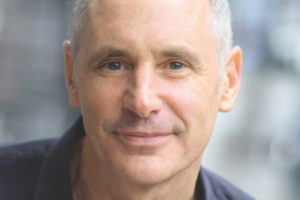
We're curious about the decision to write two characters for Megan, the woman, and one for all the male characters. Tell us about it!
This was Mark’s idea from the beginning, and I was totally game. I think having one baritone sing all of the male parts gives a fantastic vehicle for that singer. There are a lot of characters, and they are all quite different, so it’s a lot of fun. Also, and perhaps this is the elephant in the room, having only three singers makes this opera very approachable from a logistical and financial perspective. Since the male roles are so small, yet so varied, it seemed to make sense to use one singer for all of them. Also, since the male characters never appear together, yet the female (Megan A and B) are always together, it made sense to use two singers for Megan, and one for all of the male characters.
What message do you hope for the audience to receive, if any?
Personally, I just hope that the audience (and musicians!) have fun with it. Although there are definitely reflective and even serious moments throughout the opera, especially at the end, what’s beautiful about both Stephen's story and Mark’s libretto is how much it represents the human condition. We’ve all experienced the stress of trying to keep it all together, the occasional monotony of relationships, and wanting something more out of life. In this case, we experience it through the lens of a woman who seems to want it all, at least as far as relationships are concerned, yet she can’t keep it all together. I hope audience members leave thinking that this is what contemporary opera can be, and what makes it so wonderful: the possibility of experiencing something fresh—Fresh Squeezed!—and potentially about characters and stories that are of our time, characters and stories we can relate to. Ultimately, I hope your audiences fall in love with our opera and leave wanting more!
***
Robert Paterson has won awards for his music in virtually every classical genre, and he has been called a “modern day master” (AXS), and “the highlight of the program” (The New York Times). Gramophone recently noted that Paterson “could probably set a telephone book to music and create something that captivates...” Named The Composer of The Year by the Classical Recording Foundation, his music is featured on over twenty albums and his works have been performed internationally by over one hundred ensembles, including the Minnesota Orchestra, American Composers Orchestra, Louisville Orchestra, Austin Symphony, Vermont Symphony, and the Albany Symphony, as well as Shreveport Opera and Opera Orlando, among others. This past season’s highlights included performances by the Buffalo Philharmonic Orchestra, Delaware Symphony, and the Atlantic Classical Orchestra, as well as the critically acclaimed Nashville Opera world premiere of Three Way and the New York premiere at BAM. Notable awards include the Copland Award, the Utah Arts Festival award, and a three-year Music Alive! grant from the League of American Orchestras and New Music USA. Paterson’s most recent award is the Alfred I. DuPont Composers Award from the Delaware Symphony, given to a distinguished American composer or conductor who has made a significant contribution to the field of contemporary classical music. Paterson’s works are published by Bill Holab Music. For more information, visit robertpaterson.com.
***
Mark Campbell’s work as a librettist is at the forefront of the current contemporary opera scene in this country. A prolific writer, Mark has produced 28 opera librettos, lyrics for 7 musicals, text for 5 song cycles and one oratorio and his works for the stage have been performed at more than 60 venues around the world. The composers with whom he collaborates represent a roster of the most eminent composers in classical music and include three Pulitzer Prize winners. Mark’s best-known work is Silent Night, which received the 2012 Pulitzer Prize in Music and was produced at Wexford in 2014.
Other successful operas include Elizabeth Cree, As One, The Shining, The (R)evolution of Steve Jobs, Later the Same Evening, The Manchurian Candidate, Volpone, Rappahannock County, Approaching Ali, Bastianello/Lucrezia, and The Nefarious, Immoral but Highly Profitable Enterprise of Mr. Burke & Mr. Hare. Awards include: a Grammy nomination, the first Kleban Award for Lyricist, two Richard Rodgers Awards, a Larson Foundation Award, and a NYFA Playwriting Fellowship. In addition to his writing, Mark mentors for the next generation of librettists through such organizations as American Opera Projects, American Lyric Theatre, and the American Opera Initiative. Upcoming premieres include: Stonewall for New York City Opera, Today It Rains for Opera Paralléle, Edward Tulane for Minnesota Opera and the book for the musical Les Girls at Théâtre Du Châtelet. www.markcampbellwords.com
Admission and info for FSOO here.
FSOO Creator Spotlight - Emily Roller and Peter Michael von der Nahmer
One Ounce Opera will present the World Premiere of The Cookies Call: A Tragic Tragedy during the 4th Annual Fresh Squeezed Ounce of Opera showcase, March 22-24 and 29-31, 2019. This quick romp through a sticky situation features singers Shelley Burton (Emmy), Jake Jacobsen (Cookies), Dalton Flake (The Director), and a Cookies Chorus (Rebekah Staley, Kaylie Warfield, and Andy Fleming), with choreography (yes -- choreography!) by local guest artist Laura Walberg (Austin Playhouse, Tapestry Dance, et al). The cast asked Emily Roller, librettist and Peter "Mike" von der Nahmer, composer (who returns for his SECOND FSOO -- previously featured in 2017) the following questions, here answered by Emily:
What was your creative process? Did you both work together to create the opera, or was it more like 2 separate puzzle pieces coming together?
Mike and I met at the Graduate Musical Theater Writing Program at NYU Tisch. We were there to work on musicals, but Mike very quickly started trying to convince me to try my hand at opera libretti as well. I was hesitant. I hadn’t seen many, and the art form struck me as a bit snooty. Just before a long weekend at school, Mike asked me if I could take a look at an opera that he had written to a German libretto. He said he always liked the music, but he would love to have an English version. I spoke a little German—enough to understand the basic plot. I really liked the music, but I thought that the story was heavy-handed and really just heavy in general. I didn’t want to translate it, but I said that I would re-write the libretto to the music that he had already written—just for the fun of it. (I took piano lessons for many years, and while I did not practice enough to play well, I can read rhythm and music enough to write music-first.) He happily agreed to let me try, and I wrote the first draft over that weekend. It was fun! And luckily he did not mind that I turned his “demon†character into personified cookies.
Was irony your main motivation when writing this?
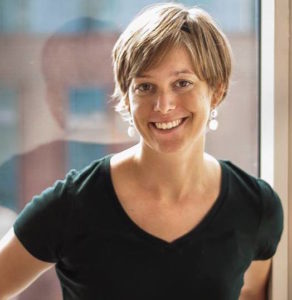
So as you might guess from my answer above, I definitely approached this project with a sense of irony and, to some degree, skepticism for opera as an art form. But the most ironic thing is that this piece launched me into the opera world. I had so much fun writing this piece that I began seriously pursuing other opera opportunities—and I have grown to love and appreciate opera (both the traditional rep and the potential for new American opera) as much as I love musical theater. That said, the general message of the piece still rings true for me. I very much believe in blending “high†and “low†art—and in writing theater that is not just “good for you†but also captivating. I think American opera has the exciting opportunity to integrate forms of vernacular music and updated (dare I say, more entertaining) storylines—while still taking advantage of the power of the classically-trained voice to convey emotion and character and the dramatic side of our human existence.
Was the chorus representative of something else? Our id perhaps?Â
I can definitely understand an interpretation of the chorus as our id. I was thinking of them more as representative of society in general—and the mixed messages we receive. At the time, I was trying to navigate the artistic world of New York, which felt worlds away from the Ozarks (where I grew up). I think New York simultaneously tells us to give into temptation and to withstand temptation. Have another round, but don’t gain that extra pound.
Were "cookies" always meant to be symbolic, or did one of you struggle with giving into cookies on a more personal basis?
Ha! Well, cookies were certainly my combined apple/serpent in the Garden of Eden. But probably the paper that I’m most proud of writing in college was one in which I used my inability to say no to the peanut butter cookies that were always at the dining hall to disprove Plato’s theory about the inexistence of weakness of will. Plato believed that weakness of will does not exist because we always actually make decisions that we believe (deep down) will benefit us. I argued that I knew for certain that that inevitable peanut butter cookie did me no good on any level. (It wasn’t even my favorite dessert, as I am much more of an ice cream woman.) But I still always took and ate one (or two). So I suppose I associate them with our complex human condition. I will also say that the cookies helped me win Mike over on the idea, as his wife is also particularly fond of cookies and closely identified with the heroine of the piece.
***
Emily (E. J.) Roller is a writer, librettist, and educator. Read more of her essays, anecdotes, prose, and fiction at http://www.ejroller.com/
***
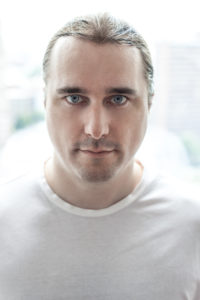
Peter Michael von der Nahmer (“Mike") is a composer, sound researcher and maker of transformative theater based in New York City. His American/German/Cuban heritage influences the questions of identity, complexity, and transcendent connection that shape his music. He has written over 30 works for musical theater, opera and dance, and over 100 works for concert and film; many have received national/international awards and been performed around the world. His 2018 work of musical theatre, WELCOME TO HELL, premiered in Berlin to critical acclaim and  currently nominated for the most popular new musical of 2018 in Germany. Mike holds a B.A. in composition from the University of Music and Performing Arts, Munich and an M.A. in Music Therapy from the University of Augsburg. He holds certificates in Film Scoring from the UCLA, and in Music Pain Treatment from the Magdeburg-Stendal University of Applied Sciences. In May 2015, he received an M.F.A. in Musical Theater Writing from New York University. Mike’s barrier-breaking, eclectic background explains his passion for music both as artistic expression and as a means to connect disparate cultures. His desire to be an agent of radical connection – to literally create harmony out of apparent dissonance – is his defining motivation.
Most recently he was awarded the 2016 McKnight Visiting composer residency, where he created a 4-hour long musical theater festival with new works by composers and writers from New Ulm, MN based on topics about the German-American heritage. In June 2017 he received an honorable mentioned in the New World Composition Challenge with his piano piece “From Here to Thereâ€, organized by the New York Philharmonic. In 2018 he was the artistic director of the MUSICAL TALES CONCERTO FESTIVAL which was awarded a Small Arts Project Grant as well as his GROWING WISE music theater and science camp for teenagers that received funding from the Optimist Club International “Bringing out the best in children†in Minnesota. He was also awarded a SU-CASA Residency in Queens (supported by the New York City Council, Department of Cultural Affairs, the department for the Aging and the Queens Arts Council)  for his GROWING YOUNG project that deals with questions about transgenerational conflicts, stereotypes of ageism, cultural heritage and social justice and retells the stories of the elderly population when they were teenagers so we can look through their eyes, appreciate and learn from their wealth of experience. https://growingyoung.mutadra.com/behind-growing-young/
Current projects include “Where is the Stillness†commissioned for the “250 piano pieces for Beethoven†to be premiered this Summer in Germany, a new towns hymn for the city of New Ulm, Minnesota to be premiered in October 2019, a new orchestral suite for the Leopold Mozart Zentrum Augsburg/Germany, the dramatic choral piece “Be the Hero†for the youth symphony and choir of the prestigious Camerloher High School Freising/Germany about the “Fridays for Future†movement, the videopera “When Falling…Dive†to be filmed in Fall 2019 in New York and full length opera “The Ayes Have it†about Lucretia Mott and the birth of the women’s movement with librettist Marianna Mott Newirth to be premiered in New York in 2020/21.  www.petermichaelvondernahmer.
FSOO Creator Spotlight - Thomas Whitman and Nathalie Anderson
Introducing the 4th Annual Fresh Squeezed Ounce of Opera showcase winners Thomas Whitman and Nathalie Anderson, creators of the micro-opera Sukey in the Dark, in its Texas Premiere.
Performing and producing new works by living composers and librettists offers artists the opportunity for real-time communication -- something Mozart and Verdi can't offer! After spending time with the scores and their characters, Sukey in the Dark cast members Julia Watkins-Davis (Sukey), Cristina Flores (Chloe), Patricia Combs (Zoe), and Robert LeBas (Eros) had these questions for the creators:
The myth of Cupid and Psyche has resonated with artists for centuries; what compelled you to bring them into the 21st century?
What drew us to this story in the era of internet seductions, clandestine bigamy, and s&m posturing was the idea that a woman might never see her lover’s face -- might agree never to see him truly -- and not realize the peculiarity of the situation until she sees herself through others’ eyes. This reminded us of situations we’ve observed, where a dysfunctional co-dependency develops incrementally, so that a couple suddenly realizes a relationship has become malignant and abusive without understanding how they could have let it happen. But we’re also aware that outsiders don’t always see the complications within unconventional relationships, and we wanted to portray this relationship not as abusive -- though Psyche’s sisters believe it is -- but as under negotiation, where Cupid is trying to protect his secret love from his family’s disapproval, and the intellectual Psyche is uneasy about losing herself -- her mind, really -- in physical intensity. We’re interested in considering how it might be possible for strong-willed men and women -- of different backgrounds, different ages, different reputations, different degrees of “deity” -- to interact as equals. In this piece, we figured that dilemma through the meshing of Psyche’s self-doubt -- “I sleep in the dark until I’m dark myself” -- and Eros’s deflective despair -- “We can’t be together; I don’t want to talk about it.”
Did the various repeating musical themes grow organically during the composition process, or did you have them in mind from the beginning?
I began composition only after I had the text of the libretto. All of the musical material evolved in response to Nathalie’s words. -TW
In the actual myth, the sisters were quite a bit more selfish/mean/"evil.". What made you change their underlying character type? And they had no names in the original myth. How did you come up with Chloe and Zoe?
Much modern opera is not interested in humor. We are. Nathalie has always loved the name Zoe, the name of a friend’s daughter, because it means “life.” She wanted something to suggest a kinship between the sisters, but also a difference, and so she came up with these rhyming names.
Some people feel that the myth of Psyche and Cupid is symbolic of the problematic issues in expectations for romantic relationships today. How do you think the characters in this story play a role in that (if any) and what do you suspect will be the outcome for Sukey and Eros?
It’s a truism of contemporary thought that romance is pernicious. It sets up expectations of perfection without effort. One thing that Eros and Sukey learn is that they have to work at it; have to listen, have to compromise. Of course, the opposite side of the mutually supportive but unconventional relationship is the manipulative power dynamic that has led to the #MeToo movement. We hope our opera encourages equality in relationships, and we hope Sukey and Eros will in fact give brith to Harmony.
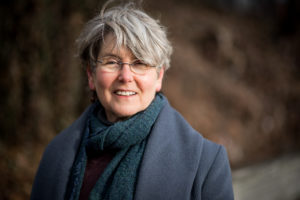
Nathalie Anderson is an award-winning poet, accomplished librettist, and Professor of English Literature at Swarthmore College. Her books of poetry include Following Fred Astaire, Crawlers, Quiver, Stain, and the chapbook Held and Firmly Bound. She has authored libretti for five operas – The Black Swan; Sukey in the Dark; an operatic version of Arthur Conan Doyle’s A Scandal in Bohemia; Cassandra; and a children’s opera, The Royal Singer – all in collaboration with the composer Thomas Whitman. Anderson received a Pew Fellowship in the Arts in 1993, and has taught at Swarthmore for 36 years, where she serves now as Alexander Griswold Cummins Professor in the Department of English Literature, and directs the Program in Creative Writing.
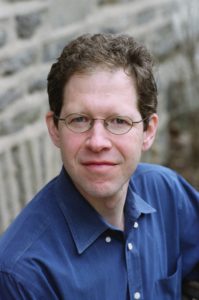
Thomas Whitman (b. 1960) began his musical studies with cellist Harry Wimmer. He studied composition with George Crumb, Gerald Levinson, Max Lifchitz, and Richard Wernick, among others. A Luce Scholar in 1986-87, he studied in Bali, Indonesia, with the late I Madé Gerindem. Other prizes and honors include an ASCAP Foundation Grant; artist residencies at the MacDowell Colony and Yaddo; and commissions from many ensembles, including Orchestra 2001, Network for New Music, North/South Consonance, Mélomanie, and Dolce Suono Ensemble. Whitman’s compositions include chamber music, dance and film scores, and five operas. On the faculty of Swarthmore College since 1990, he is the founder and co-director of Gamelan Semara Santi, the Philadelphia area’s only Indonesian percussion orchestra. He has also taught Indonesian performing arts for many years as a volunteer in urban public schools. Selected recordings are available on Avie, North/South, and Albany Records. Sheet music is available through Cassiopeia Publishing.
